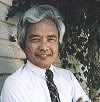by
 Dr. M. Bakri Musa (read here profile)
Dr. M. Bakri Musa (read here profile)(Dr. Bakri Musa is a surgeon in private practice in Silicon Valley, California. His family roots are from Sri Menanti, N. Sembilan)
Excerpts: Read here for more
One of Dr. Mahathir’s finest legacies (as Prime Minister) is his amending the constitution in 1993 to remove the sultans’ absolute legal immunity. With that, our sultans can now be sued over both civil and criminal matters relating to their personal conduct.
On October 15, 2008, the Special Court unanimously ordered former Yang DiPertuan Agong and current Yang DiPertuan Besar, Negri Sembilan, Tuanku Ja’afar, to re-pay the US$1mil (RM3.5mil) loan to Standard Chartered Bank.
The Court also dismissed with costs a counter-suit filed by the former King seeking for a declaration that the bank was not entitled in law to uplift his fixed deposit in settlement of any liability arising from the loan.
(The Special Court) comprised of Chief Justice Abdul Hamid Mohamad, who sat with Chief Judge of Malaya Justice Alauddin Mohd Sheriff, Chief Judge of Sabah and Sarawak Justice Richard Malanjum and Federal Court judges Justices Ariffin Zakaria and Zulkefli Ahmad Makinudin. The proceedings of the Special Court, unlike that of the regular courts, are not open. We have to wait for the judgment to be delivered to get the material facts of the case.
Justice Abdul Hamid read out the 32-page judgment over the two suits on his last day sitting on the Bench as the top judge of the country.
If not for the Constutional amendment (driven by Dr Mahathir in 1993), Standard Chartered would have to swallow its bad debts to the ruler, just like other lenders had pre-1993.
Of course the bank would not have made that loan then; its loan officers would not jeopardize their careers, unless of course the bank is one of those GLCs where normal prudent lending practices do not apply, especially when the beneficiaries are “big shots.”
The mistake the ruler made here is in borrowing from a “real” bank, a multinational outfit where its officers are true professionals who put their banking reputation ahead of the prestige of some Third World royal potentate.
There was a time however when these foreign banks were not above bribing local chieftains, but enlightened legislations back in their home country put an end to that. Foreign especially Western bankers are now liable for criminal prosecution back home if they were to engage in such activities abroad.
It is to be noted that during pre-amendment times, local bankers and businessmen willingly extended credit to our sultans fully aware that these lenders would have no recourse should our sultans renege on their promises to repay.
Those lenders were not stupid; they considered those unpaid loans as part of the cost of doing business in the state. Meaning, their other customers would have to bear those costs of unpaid royal loans. Besides, those creditors now sport fancy royal titles; to them those are payments enough. Those loans are nothing more than barely-concealed and very expensive royal bakshis (corruption).
Shad Saleem Faruqi noted in his column(“Test Case On Right To Sue Sultans,” The Star, August 20, 2008), the constitutional amendment is silent with regards to the fate of rulers during the trial or once the verdict is delivered. If convicted on matters criminal, the ruler would have to vacate (abdicate) the throne unless pardoned by his brother rulers.
With matters civil, as with non-repayment of loans, the matter is less clear.
Regardless, it would be a great shame were the Council of Rulers to pardon the Negri ruler for a measly sum of RM 3M. Surely the council would not risk besmirching its dignity by doing that.
Let us hope that their collective judgment is wiser.
The Negri ruler has shown little judgment in risking the dignity of his throne over such a small loan. I do not expect that to change should the judgment be against him. Thus expect even greater assault on the dignity of the throne.
We could thus potentially see the ruler be subjected to bankruptcy proceedings. He would not be the first member of the royal household to be so subjected, but he would be the first ruler. That would be quite a legacy.
Absent a pardon, the country would face the specter of a bankrupt ruler sitting on the throne. Even if the Council of Rulers were to grant a pardon, that would not erase the fact that the ruler was bankrupt, someone who reneged on his promise to repay his loan.
Malay sultans are more than just rulers; they are the head of Islam, Allah’s representative on earth. During khutbas in all the mosques, the sultan is always mentioned and prayers offered for his longevity and wisdom in ruling.
One of the tenets of Islam is that we must be true to our words and contracts. Non-repayment of loans is a breach of that. Specifically in referring to loans, Muslims are advised to settle their debts before the end of Ramadan, so that on Hari Raya day we would start with a fresh slate, clear of debt.
This is a time for our (Negri Sembilan) Undangs to remember why our ancestors in their wisdom chose to name the ruler of our state (Negri Sembilan) not sultan but “Yang Di Pertuan Besar.” Literally it means, “The One We Make Big.” The WE refers to the PEOPLE, as represented by our Undangs.
On a larger scale this is also the title we give the “King” of Malaysia, “Yang Di Pertuan Agong,” meaning, the one WE make supreme.
Mahathir’s 1993 constitutional amendment gives substance to the meaning of the phrase “WE make supreme.”
That amendment also made it possible for Standard Chartered to pursue its current suit against the Negri ruler.
-Dr. M. Bakri Musa
No comments:
Post a Comment